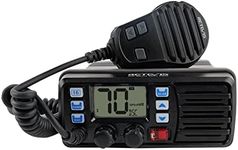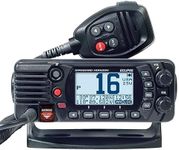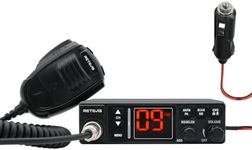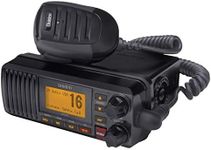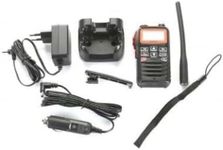Buying Guide for the Best Marine Vhf Radios
When choosing a marine VHF radio, it's important to consider the specific needs of your boating activities. A VHF radio is a crucial piece of safety equipment that allows you to communicate with other vessels, marinas, and emergency services. Understanding the key specifications will help you select a radio that meets your requirements for range, functionality, and ease of use.Power OutputPower output in a marine VHF radio determines the range of communication. It is usually measured in watts, with most radios offering 1 watt for short-range communication and 25 watts for long-range. If you are mostly boating in coastal areas or near shore, a lower power output may suffice. However, for offshore or long-distance communication, a higher power output is essential to ensure your messages are transmitted over greater distances.
Channel SelectionChannel selection refers to the number of channels available on the VHF radio. Marine VHF radios typically have access to all U.S., Canadian, and international channels. Having a wide range of channels is important for accessing weather updates, emergency channels, and communicating with other vessels. Consider your boating location and ensure the radio covers the necessary channels for that area.
DSC (Digital Selective Calling)DSC is a feature that allows you to send a distress signal with your location to other DSC-equipped radios. This is crucial for safety, as it can alert nearby vessels and rescue services in an emergency. If you prioritize safety and often venture into less trafficked waters, a radio with DSC capability is highly recommended. Ensure your radio is connected to a GPS to make full use of this feature.
Waterproof RatingThe waterproof rating indicates how well the radio can withstand exposure to water. Ratings like IPX7 or IPX8 mean the radio can be submerged in water for a certain period without damage. If you are frequently exposed to harsh marine environments or heavy rain, a higher waterproof rating is essential to ensure the durability and longevity of your radio.
Size and PortabilitySize and portability are important if you need a handheld VHF radio. A compact and lightweight design is easier to carry and store, especially on smaller boats. Consider how you will use the radio and whether you need it to be easily portable or if a fixed mount radio is more suitable for your vessel.
Battery LifeBattery life determines how long the radio can operate before needing a recharge. For handheld radios, longer battery life is crucial, especially on extended trips. Look for radios with rechargeable batteries and consider carrying spare batteries if you plan to be out for long periods. If you have access to power on your vessel, a fixed radio with a constant power source might be more appropriate.
